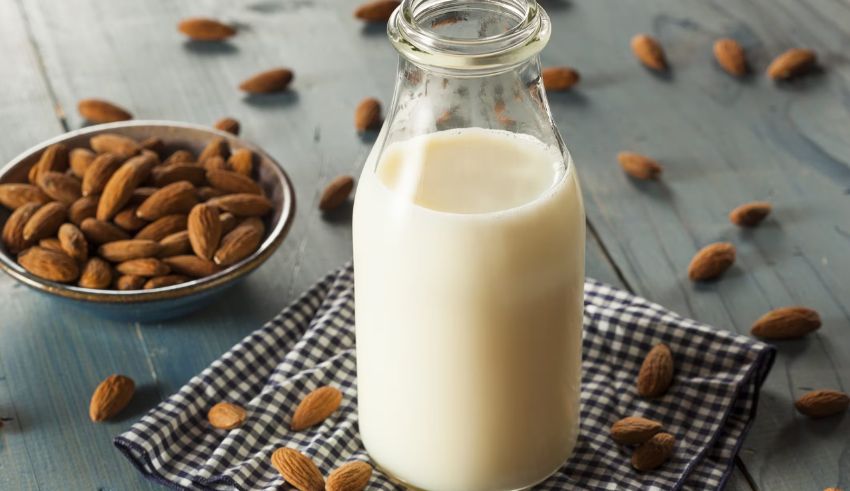

(C) Cookist
Celebrated for its amazing array of health-promoting elements as much as its great flavor, almond milk has become a popular substitute for dairy. For individuals looking for better drink options, almond milk is a wise choice in its unflavored version because of its low calorie count relative to dairy milk and many other plant-based options.
Plain, unsweetened almond milk, 3.5 ounces (100-grammes), has an amazing nutritional profile: Many producers strengthen almond milk with crucial minerals and vitamins since it is so popular as a dairy substitute so that people who avoid dairy don’t miss out on any important nutrients. Fortified almond milk is therefore a great source of calcium as well as vitamins A, E, and D.
Almond milk might be a good friend for those trying to control their weight. It provides a simple approach to reduce calorie intake as its content of calories is less than that of normal dairy milk. Studies show that little dietary changes like switching to almond milk can greatly help efforts at weight loss. Reducing total calorie consumption is connected, according to an analysis of 67 research, to effective weight control. But be aware of flavored or sweetened commercial types, which may contain extra sugars raising calorie counts.
With just 0.3 grams per 3.5-ounce cup, unsweetened almond milk is naturally low in carbs. This is especially less than dairy milk, which has roughly 4.6 grams of carbs mostly from lactose. Choosing unsweetened almond milk can assist those watching their carbohydrate intake—that of those with diabetes—keep steady blood sugar levels. Check nutrition labels since many sweetened almond milk products include additional sugars, which can cause blood sugar rises.
With a 3.5-ounce serving, almond milk has 22% of the daily recommended consumption of vitamin E. Powerful antioxidant vitamin E battles oxidative damage and inflammation in the body. Vitamin E might potentially reduce the risk of chronic diseases including cancer and heart disease by neutralizing free radicals—unstable chemicals that can damage cells. Studies also point to possible improvement in body fat metabolism; additional research is required to validate these effects in individuals.
Many facets of health, including immune system performance and bone strength, depend on vitamin D. Many people—especially those with little sun exposure—may not get enough vitamin D, so fortified almond milk is a good dietary source. About 5% of the Daily Value of vitamin D can come from a normal meal, which will help those who could be deficient keep appropriate levels. But not all types of almond milk are fortified, hence, if necessary, it is advisable to look for other dietary sources.
Many people get their calcium—a mineral vital for bone health—from dairy. Offering 17% of the Daily Value in a 3.5-ounce drink, enhanced almond milk can be a major source. Maintaining strong bones and normal blood pressure depends on calcium in great part. Studies have indicated, especially for elderly persons, eating foods high in calcium helps improve bone density. Those preparing almond milk at home should think about including other calcium sources into their diet to satisfy their dietary requirements.
Since almond milk is naturally lactose-free, folks with lactose sensitivity would find it to be the perfect choice. This disorder causes discomfort when consuming dairy products and affects a good number of people worldwide. Almond milk lets those with lactose sensitivity enjoy a creamy drink free from related stomach problems.
Naturally dairy-free as a plant-based milk, almond milk appeals to vegans and others avoiding dairy for ethical or health concerns. Individuals with tree nut allergies should definitely avoid almond milk, though. Though its protein level is lower than that of dairy milk, almond milk is a safe substitute for many since it lacks the proteins usually causing milk allergies. However, it is less suited for young children.
Because almond milk has less phosphorus and potassium than other dairy substitutes, patients with chronic kidney disease (CKD) may find it to be a better fit. For CKD sufferers, high levels of these minerals can cause health problems; therefore, almond milk—containing much less phosphorus and potassium than dairy—may help reduce those risks. Still, reading nutrition labels is crucial as brand nutrient values differ.
New studies relate dairy intake to skin problems including acne. With so much vitamin E, almond milk could provide a skin-friendly substitute. By lowering damage from free radicals, vitamin E functions as an antioxidant, perhaps improving skin condition. Regular use of almond milk, especially in line with a balanced diet, could help to promote better skin.
Including almond milk into a plant-based diet might help with heart health. Research on plant-based diets have indicated they help lower cardiometabolic disease risk. Participants on a whole-food, plant-based diet showed better blood sugar control and lower cholesterol according to a New Zealand study. These developments link to a lower risk of heart disease, which emphasizes the heart-healthy possibilities of having almond milk in your diet.
Making almond milk at home merely calls for two ingredients— almonds and water—and is easy. Soak one half cup (65 grams) of raw almonds overnight to make two cups (473 mL) of almond milk. Blend the soaked almonds with two glasses of water until the liquid comes together smoothly. Strain extra moisture by running a nut milk bag through. For your preferred thickness, change the water amount; for taste, think of drizzling honey or adding a bit of salt. Refrigerated homemade almond milk keeps for up to five days.
The adaptability of almond milk qualifies it as a great ingredient to many recipes. Use it as a refreshing beverage on its own, in cereal, coffee, smoothies, or cooking and baking uses like soups and pancakes. Its moderate taste enhances a variety of foods, enabling new gastronomic adventures.
Nutrient-dense, dairy-free substitute with many health advantages is almond milk. Fortified versions provide vital minerals and vitamins, guaranteeing enough nutrition for individuals who choose to substitute dairy milk. Perfect for people following a vegan diet, lactose intolerance, dairy allergies, or those otherwise, almond milk can improve your diet in tasty and nutritious ways.
Perfect for mixing with a tall glass of your handmade almond milk, think about whipping some great biscuits from leftover almond pulp!
NextRise 2025-the biggest startup and tech event in Asia-is ready to take place in Seoul on June 26-27 at COEX,…
On this reunion occasion marking 20 years after their debut, the anticipation of the fans seems to be reaching greater…
South Korean boy band RIIZE is returning to Singapore on January 24, 2026 as part of their “RIIZING LOUD” Asia…
Experience Japan’s longest running all-night rock festival, RISING SUN ROCK FESTIVAL 2025 in EZO, with incredible acts, a wealth of…
United States Immigration and Customs Enforcement conducted audits of three Denver cleaning companies, leading to more than $8 million in…
Cricket fans, rejoice! The Olympic Council of Asia (OCA) has confirmed that cricket will be part of the 2026 Asian…
This website uses cookies.
Read More